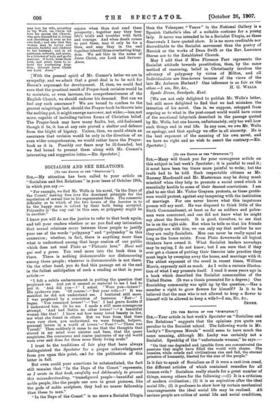SOCIALISM AND SEX RELATIONS. [TO TUE EDITOR OF THE „ SPECTATOR. "]
Six,—My attention has been called to your article on "Socialism and Sex Relations " in your issue of October 19th, in which you say :—
" For example, we find Mr. Wells in his novel, 'In the Days of the Comet,' making free love the dominant principle for the regulation of sexual ties in his regenerated State. The romantic difficulty as to which of the two lovers of the heroine is to be the happy man is solved by their both being accepted. Polyandry is the way out' in this case, as polygamy might be in another."
I know you will do me the justice to refer to that book again, and tell your readers whether or no you find any intimation that sexual relations occur between these people to justify your use of the words " polygamy " and "polyandry" in this connexion ; whether, in fact, there is anything more than what is understood among that large section of our public which does not read Plato as " Platonic love." Honi soit qui maly pense. You read more into the book than is there. There is nothing dishonourable nor dishonouring among these people; whatever is dishonourable is not there. On the other hand, you do find this passage set at the end in the fullest anticipation of such a reading as that in your
article :-
"I felt a subtle embarrassment in putting the question that perplexed me. And yet it seemed so material to me I had to put it. ' And did you— ? ' I asked. Were you—lovers ? '
His eyebrows rose. Of course.'—' But your wife— ? ' It was manifest he did not understand me. I hesitated still more.
I was perplexed by a conviction of baseness. But—' I began. You remained lovers?' Yes.' I had grave doubts if I understood him. Or he me. I made a still more courageous attempt. 'And had Nettie no other lovers ? '—`A beautiful woman like that ! I know not how many loved beauty in her, nor what she found in others. But we four from that time were very close, you understand, we were friends, helpers, personal lovers in a world of lovers.'—' Four ? '—"fhere was Verrall.' Then suddenly it came to me that the thoughts that stirred in my mind were sinister and base, that the queer suspicions, the coarseness and coarse jealousies of my old world were over and done for these more finely living souls."
I trust to the traditions of fair play that have always distinguished the Spectator for a proper acknowledgment from you upon this point, and for the publication of this letter in full.
But even could your assertions be substantiated, the fact still remains that "In the Days of the Comet " represents, as I wrote in that book, carefully and deliberately to prevent this misunderstanding, "transfigured people—beautiful and noble people, like the people one sees in great pictures, like the gods of noble sculpture, they had no nearer fellowship than these to men."
"In the Days of the Comet" is no more a Socialist Utopia than the Velazquez " Venus " in the National Gallery is a Spanish Catholic's idea of a suitable costume for a young lady. It never was intended to be a Socialist Utopia, as these disavowals I have quoted show. It is no more creditable nor discreditable to the Socialist movement than the poetry of Herrick or the works of Dean Swift or the Rev. Laurence Sterne are to the Established Church.
May I add that if Miss Florence Farr represents the Socialist attitude towards prostitution, then, by the same method of reasoning, belief in Christianity involves the advocacy of polygamy by virtue of Milton, and all Individualists are free-lovers because of the views of the late Mr. Auberon Herbert ? One inference is as fair as the
other.—I am, Sir, &c., H. G. WELLS.
Spade House, Sandgate, Kent.
[We are not only delighted to publish Mr. Wells's letter, but still more delighted to find that we had mistaken the intention of his novel. One is, we suppose, estopped from arguing as to what in the post-comet world would have come of the emotional labyrinth described in the passage quoted by Mr. Wells, but one knows, unfortunately, only too well bow such things end in real life. In any case, we owe Mr. Wells an apology, and that apology we offer in all sincerity. He is the best exponent of the meaning of his own novel, and we have no right and no wish to assert the contrary.—En.
Spectator.]










































 Previous page
Previous page